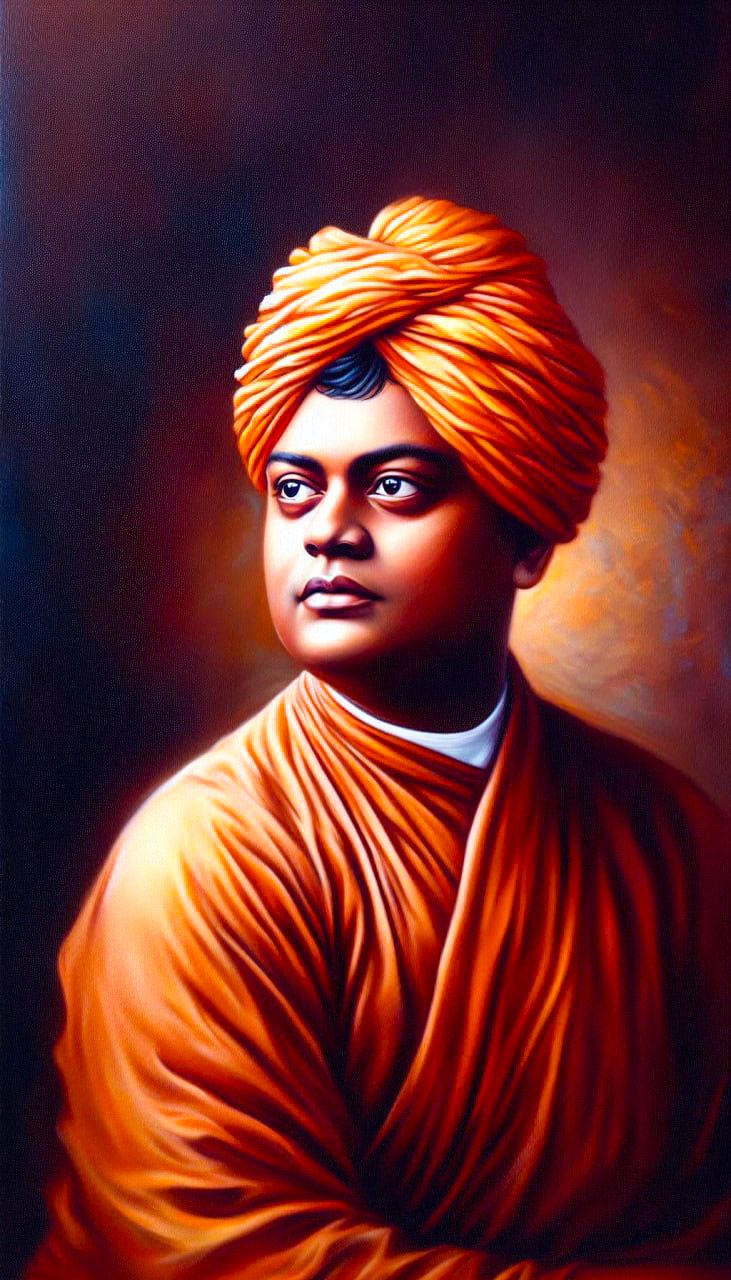Swami Vivekananda: A Visionary Monk and India’s Spiritual Luminary
Swami Vivekananda (1863–1902) was one of India’s greatest spiritual leaders, philosophers, and reformers. Known for his groundbreaking speech at the 1893 Parliament of the World’s Religions in Chicago, Vivekananda introduced Indian philosophies of Vedanta and Yoga to the Western world. His ideas of self-confidence, service to humanity, and universal harmony have inspired generations.
Early Life and Education
Swami Vivekananda was born as Narendranath Datta on January 12, 1863, in Kolkata, India. His father, Vishwanath Datta, was a lawyer, and his mother, Bhuvaneshwari Devi, was deeply spiritual.
From a young age, Narendranath was curious, intelligent, and contemplative. He was a voracious reader and was drawn to philosophy, religion, and science. He excelled in academics and graduated from the Scottish Church College in Kolkata, where he studied Western philosophy and logic.
Spiritual Journey and Meeting Ramakrishna
Narendranath’s life changed when he met Ramakrishna Paramahamsa, a mystic and spiritual teacher, in 1881. Initially skeptical, Narendranath questioned Ramakrishna’s teachings but was soon deeply influenced by his profound spiritual insights and simplicity.
- Ramakrishna taught him that all religions lead to the same truth, emphasizing universal tolerance and love.
- After Ramakrishna’s passing in 1886, Vivekananda took monastic vows and assumed his spiritual name, dedicating his life to serving humanity.
Key Contributions and Achievements
1. Speech at the 1893 Parliament of the World’s Religions
Vivekananda’s address in Chicago on September 11, 1893, began with the iconic words, “Sisters and Brothers of America.” This speech captivated the audience with its message of universal brotherhood, tolerance, and India’s spiritual heritage.
- He emphasized the harmony of religions and India’s philosophy of oneness, leaving an indelible mark on global thought.
2. Establishing the Ramakrishna Mission
In 1897, Vivekananda founded the Ramakrishna Mission in Kolkata, inspired by his guru’s teachings. The mission combined spirituality with social service, focusing on:
- Education and healthcare for the underprivileged.
- Disaster relief efforts.
- Promoting interfaith harmony.
3. Reviving Indian Spirituality
Vivekananda reignited pride in India’s rich spiritual traditions during a time of colonial rule and cultural suppression. He urged Indians to embrace their heritage while adopting modern scientific approaches.
4. Philosophy of Practical Vedanta
He reinterpreted Vedanta, making it practical and accessible for everyday life. Vivekananda taught that spirituality was not about rituals but about realizing one’s potential and serving others selflessly.
5. Role in Women’s Empowerment
Vivekananda emphasized the importance of women’s education and empowerment. He regarded women as the embodiment of strength and wisdom, inspiring society to respect and uplift them.
Teachings and Philosophy
Swami Vivekananda’s teachings were deeply rooted in Vedantic philosophy. His core messages include:
- Universal Brotherhood: All religions lead to the same divine truth; therefore, humanity should embrace tolerance and harmony.
- Self-Confidence and Self-Reliance: “Arise, awake, and stop not till the goal is reached” became his clarion call to awaken individuals to their infinite potential.
- Service to Humanity: He believed that serving others was the highest form of worship, urging people to see divinity in all beings.
- Spiritual Growth: Vivekananda emphasized inner growth, discipline, and meditation as paths to self-realization.
Daily Life and Work Ethic
Vivekananda lived a disciplined and austere life. He rose early, meditated, and engaged in intellectual and spiritual discussions. His day was devoted to teaching, writing, and serving others. Despite his busy schedule, he maintained a calm demeanor and an unwavering focus on his mission.
His travels across India exposed him to the country’s social and economic challenges. These experiences deepened his resolve to uplift the masses through education, service, and spiritual empowerment.
Legacy and Impact
1. Inspiring the Youth
Swami Vivekananda is regarded as a role model for youth. His birth anniversary, National Youth Day, is celebrated every year on January 12 to honor his ideals of courage, self-confidence, and selfless service.
2. Spiritual Renaissance
He revitalized Indian spirituality, giving it a global voice. His teachings continue to resonate worldwide, inspiring people to lead lives of purpose and integrity.
3. Social Service Movement
Through the Ramakrishna Mission, his vision of combining spirituality with service remains a guiding force for humanitarian efforts in India and abroad.
4. Global Impact
Vivekananda’s introduction of Indian philosophy to the West laid the groundwork for the global interest in Yoga, Vedanta, and mindfulness practices.
Observance and Celebrations
- National Youth Day: Marked by speeches, debates, and cultural events inspired by Vivekananda’s teachings.
- Ramakrishna Mission Programs: Regular activities, including meditation sessions, lectures, and social service initiatives, keep his legacy alive.
Interesting Facts About Swami Vivekananda
- First Indian Monk in the West: Vivekananda was the first Indian monk to represent Hinduism on an international stage.
- Multi-Linguist: He was fluent in Bengali, Sanskrit, English, and several other languages.
- Avid Reader: Vivekananda could finish books quickly and had an exceptional memory, often recalling exact passages.
- Philosophy and Science: He seamlessly blended spiritual teachings with scientific principles.
- Short but Impactful Life: Vivekananda passed away at the young age of 39, but his legacy endures globally.
FAQs About Swami Vivekananda
1. Why is Swami Vivekananda called the “Spiritual Ambassador of India”?
He introduced Indian spirituality and philosophy to the Western world, emphasizing universal values like tolerance and harmony.
2. What is Swami Vivekananda’s famous quote?
“Arise, awake, and stop not till the goal is reached.”
3. What was the significance of his Chicago speech?
It established India’s spiritual prominence on a global stage and advocated for interfaith harmony.
Significance in Modern Society
Swami Vivekananda’s ideas are deeply relevant today. His emphasis on universal brotherhood, youth empowerment, and service to humanity provides a blueprint for addressing modern challenges. His teachings inspire people to transcend divisions and work collectively for a better world.
Wishing Vivekananda’s Vision Forward
Embracing Vivekananda’s message means striving for self-realization while contributing to society. His life is a reminder that inner strength and compassion can transform individuals and nations alike.
Final Thoughts
Swami Vivekananda’s life was a testament to the power of spirituality, intellect, and selfless service. His teachings continue to illuminate the path for millions seeking purpose and harmony in life.











For the reason that the admin of this site is working, no uncertainty very quickly it will be renowned, due to its quality contents.